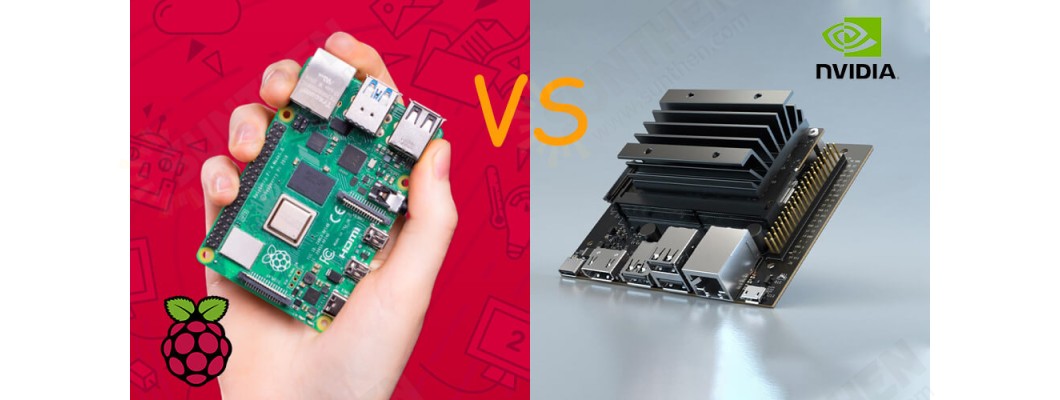
Raspbery Pi and NVIDIA Jetson Nano is the most well-know devices for AI development project. In March 2019, NVIDIA released the Jetson NANO developer kit, which is an ideal, affordable manual smart computer for manufacturers, DIY, students, and other embedded developers. Since then, the Raspberry Pi also released a new product, the Raspberry Pi 4, made a full range of performance improvement compared the 3-generation Raspberry Family.
Upon initial comparison it appeared that they basically have the same features, with the Nano having an addition dedicated GPU on the board. Let’s compare the two boards and see what all the differences really are. Which will be helpful for you to make a decision in development project.
Raspberry Pi 4B
The Raspberry Pi 4B is a "plug-and-play" board computer, which is also a good starting point for learning AI artificial intelligence projects. Based on the Linux operating system, you can use a large number of Linux free software and tools.
Raspberry Pi 4B is suitable for people of all ages, such as programming languages like Python. At the same time, it can also do everything you expect, like browsing web, play HD video, make spreadsheets, perform text processing, and play games.
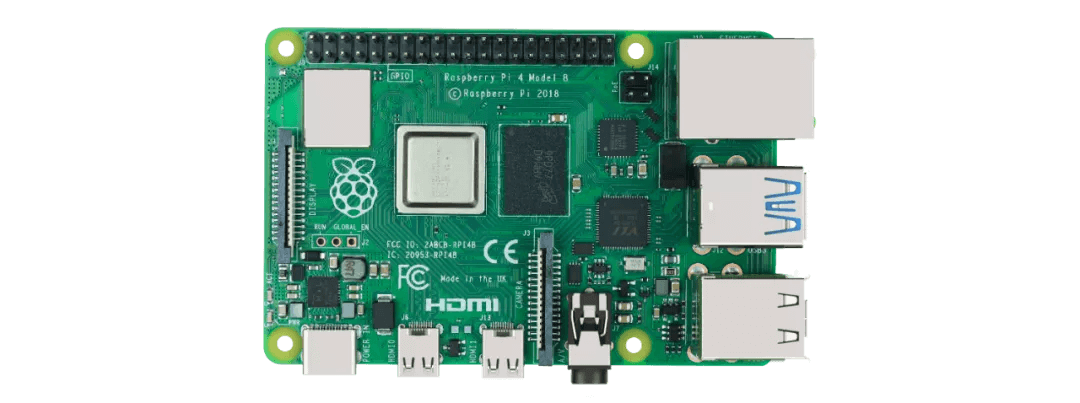
Compared to the previous Raspberry Pi 3 B+, the Raspberry Pi 4 B contains the following upgrades:
- Faster processor: CPU upgrades to quad-core Cortex-A72 (ARM V8) 64-bit SOC @ 1.5 GHz.
- More memory: LPDDR4-2400 SDRAM provides multiple models such as 1GB, 2GB, and 4GB RAM.
- Double 4K graphics card: 2 mini HDMI ports can output 4K video, even support double displays.
- 2 USB 3 and 2 USB 2 ports: New version has 2xUSB 3 ports, which can be connected to peripheral devices at a higher speed;
- USB-C Power: The power connector of the board is upgraded from Micro-USB to the USB-C connector.
- I / O: 40-pin GPIO connector (support I2C, SPI, and UART).
The above is the main difference between the new RASPBERRY PI 4 and the old Raspberry PI 3. Compared with the old motherboard, the new version of Raspberry PI 4 has higher processing capabilities and other advantages.
NVIDIA Jetson Nano
Jetson Nano development board is also a powerful small artificial smart computer, which only needs to insert a MicroSD card with a system image to start, built-in SOC system-level chip, can have a parallel hand, such as Tensorflow, Pytorch, Caffe / Caffe2, Keras, MXNET and other neural networks that can be used to achieve functionality such as image class, target detection, speech segmentation, and intelligent analysis. Usually used to build autonomous robots and complex artificial intelligence systems.
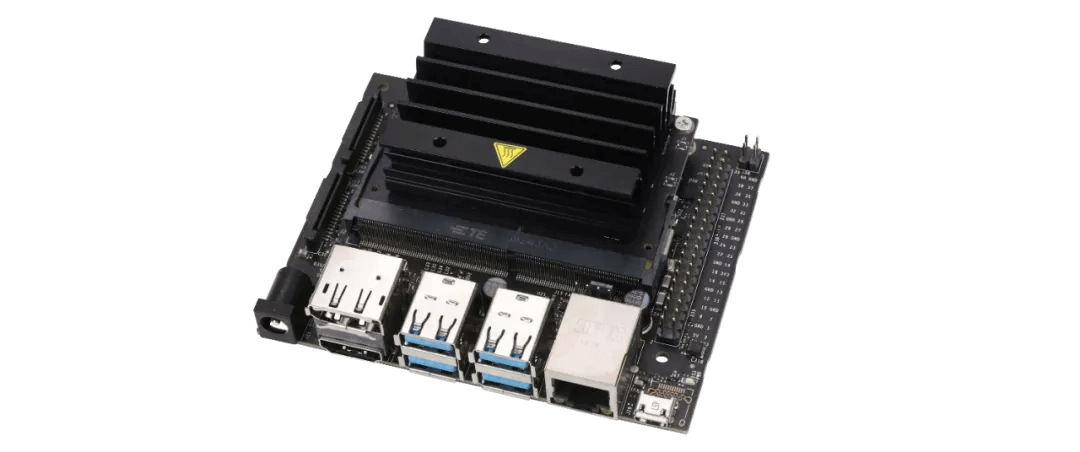
The following is the core specification of NVIDIA Jetson Nano Developer Kit:
- CPU: quad-core ARM CORTEX-A57 MPCORE processor
- GPU: NVIDIA MAXWELL W / 128 NVIDIA CUDA core
- Memory: 4 GB 64-bit LPDDR4
- Graphics: HDMI and DisplayPort output
- USB: 4 USB 3 ports
- I / O: I2C, SPI, UART, and GPIO connector compatible with Raspberry Pi
NVIDIA Jetson Nano Developer Kit provides all computing power required when designing prototypes (also integrated GPU).
Cortex-A72 VS Cortex-A57 CPU Comparison
The Raspberry Pi 4B uses a 4-core Cortex-A72 architecture of CPU with a frequency of 1.5GHz, while Jetson Nano uses a 4-core Cortex-A57 architecture CPU with a frequency of 1.43GHz.
See the table below for specific parameters:
| Specification | Cortex-A72 | Cortex-A57 |
Board used | Raspberry Pi 4 | NVIDIA Jetson Nano |
| Microarchitecture | ARMv8-A 64-bit | ARMv8-A 64-bit |
| Cores | 4 | 4 |
| Clock speed | 1.5 Ghz | 1.42 Ghz |
| Manufacturing process | 28nm | 24nm |
| L1 cache | 80 KiB (48 KiB I-cache with parity, 32 KiB D-cache with ECC) per core | 80 KiB (48 KiB I-cache with parity, 32 KiB D-cache with ECC) per core |
| L2 cache | 512 KiB to 4 MiB | 512 KiB to 2 MiB |
| L3 cache | None | None |
| Year CPU Released | 2015 | 2013 |
According to official information, Raspberry PI 4B Cortex-A72 is about 50% faster than the previous generation of Raspberry PI 3 B + Cortex-A53 processors, while NVIDIA Jetson Nano is located between the Raspberry PIs between two generations of CPUs.
In fact, they are actually very similar in primary functions, and all can develop some special functions, such as ARM processors, 4GB RAM, and a series of peripherals.
The biggest difference is that the Raspberry Pi has a low power VideoCore multimedia processor, and Jetson Nona contains higher performance, more powerful GPUs (graphics processors), which makes it support some functions that Raspberry Pi Can't do. Then Jeston Nona make some more depth developments possible and have more potential in development.
Raspberry Pi 4 vs NVIDIA Jetson Nano Specification Comparison
After comparison of the CPU performance, let's take a detailed comparison of the specifications of the Raspberry PI 4 and NVIDIA Jetson Nano Developer Kit.
Raspberry Pi 4 | NVIDIA Jetson Nano | |
CPU | Quad-core ARM Cortex-A72 64-bit @ 1.5 Ghz | Quad-Core ARM Cortex-A57 64-bit @ 1.42 Ghz |
GPU | Broadcom VideoCore VI (32-bit) | NVIDIA Maxwell w/ 128 CUDA cores @ 921 Mhz |
Memory | 4 GB LPDDR4** | 4 GB LPDDR4 (2 GB version also available)*** |
Networking | Gigabit Ethernet / Wifi 802.11ac | Gigabit Ethernet / M.2 Key E (for Wifi support) |
(2 GB version includes USB Wireless adapter) | ||
Display | 2x micro-HDMI (up to 4Kp60) | HDMI 2.0 and eDP 1.4 |
USB | 2x USB 3.0, 2x USB 2.0 | 4x USB 3.0, USB 2.0 Micro-B |
Other | 40-pin GPIO | 40-pin GPIO |
Video Encode | H264(1080p30) | H.264/H.265 (4Kp30) |
Video Decode | H.265(4Kp60), H.264(1080p60) | H.264/H.265 (4Kp60, 2x 4Kp30) |
Camera | MIPI CSI port | MIPI CSI port |
Storage | Micro-SD | Micro-SD |
The main features of Raspberry PI 4 and NVIDIA Jetson Nano are very similar. And the above is not full function list, so there are some differences that do not appear in the above table.
They both have ARM processors, 4GB RAM, and a series of peripherals. NVIDIA Jetson Nano has 128 CUDA core NVIDIA MAXWELL GPUs that are actually comparable to GPU (Cortex-A57) in the Nintendo Switch Game console. NVIDIA Jetson Nano's CPU and GPU hardware are very close to NIntendo Switch, except NVIDIA TEGRA X1 SOC (on-chip system) hardware in Nintendo Switch, and four Cortex-A53 kernels. This undoubtedly enhances the potential of NVIDIA Jetson nano.
Note: Raspberry Pi 4 vs NVIDIA Jetson Nano Developers kits is shortage from the end of 2021 to now, because of the shortage of chip and original factory closed. The price fluctuations almost every week.
Need to buy Raspberry Pi or NVIDIA Jeston Nano? Please contact us at sales@sunthen.com iwht professional selection and bulk order discount.
Recently, NVIDIA released the updated version of Jetson Nano development kit, supports 2 MIPI CSI cameras, which can extend more machine visual applications.
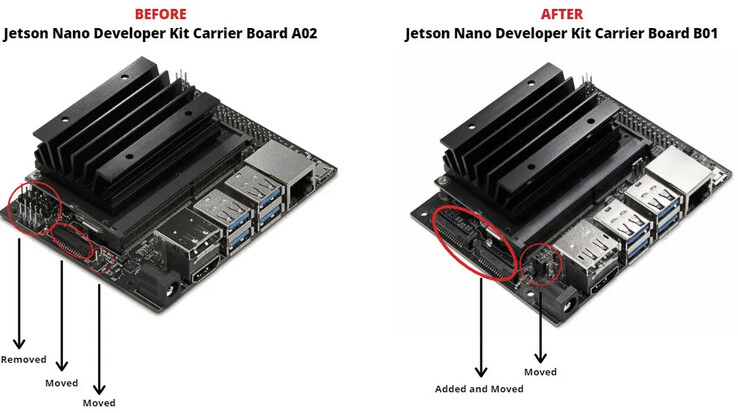
Like the Raspberry, Jetson Nano also has complete communication connectors, like GPIO, I 2 C, I 2 S, SPI, UART.
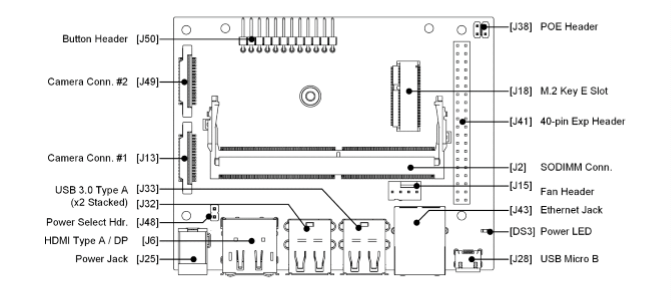
- I2C: I2C is a serial protocol for connecting low speed devices such as embedded systems such as microcontrollers, EEPROMs, A / D, and D / A converters, I / O interfaces.
- UART: Universal asynchronous transceiver allows your device to connect to a serial section. The UART pin is marked as TXD and RXD.
- SPI: Serial Peripheral Interface is a synchronous serial communication interface specification for short-range communications, mainly for embedded systems. The SPI is marked as MOSI, MISO, SCLK, CE0 and CE1.
Easyibility & Resource Comparison
First, the easyibiliby, Raspberry Pi will be more suitable for a beginner.
The Raspberry Pi 4B is more easy and with more resource, which suitable for most people. You can easily find a solution for most problems. If you are new to the artificial intelligence field, or want to start a small project for competition, build a platform, or use to learn Python programming, the Raspberry Pi will be a better choice. As there is more information in website and it’s relatively easy to get on.
Jetson Nona performance is superior to the Raspberry Pi, which is very advantageous in AI and deeply learned. If you need to build an AI or a machine learning project, Jetson NANO with full GPU may be the most ideal choice. But it will be more difficulty to get started and require a certain basis. If you want to learn deep AI learning, the practicality of Jetson Nano will be bigger, whether it is a robot, aircraft, intelligent cars, the Jetson Nano will work better than the Raspberry.
Second, Jetson Nano provide more resource on neural networks and depth learning.
NVIDIA spent ten years to establish and promote artificial intelligence platform, which aims to help engineers and data scientists training, optimize and deploy neural networks.
Engineers and data scientists use different frameworks for different applications. At the beginning of our test, Jetson Nano supports currently popular depth learning frameworks, including Tensorflow, Pytorch, MXNET, KERAS, and CAFFE.
Note NVIDIA Open Source Robot JetBot project is Tensorflow.
On Jetson Nano, users can match the NVIDIA TENSORRRT reasoning engine, the optimization of mixing accuracy, which easily push up the reasoning performance again. With NVIDIA supports Caffe, Tensorflow, Torch's Digits Depth Learning Server, users can easily train their (or others), easy to transplant them to Jetson Nano to execute the exclusive application, this has the opportunity to reduce the developers 70 % R & D time.
Summary
After the comparison, the features provided by Raspberry Pi 4 vs NVIDIA Jetson Nano are almost identical. You should consider the hardware specs, and of course price to determine which board best fits your needs. Both of these boards run Linux and have pretty much the same capabilities, but if you need to build Artificial Intelligence (AI) and Machine Learning (ML) projects, then the NVIDIA Jetson Nano having a full blown GPU will likely be the board chosen.
Note: Raspberry Pi 4 vs NVIDIA Jetson Nano Developers kits is shortage from the end of 2021 to now, because of the shortage of chip and original factory closed. The price fluctuations almost every week.
Need to buy Raspberry Pi or NVIDIA Jeston Nano? Please contact us at sales@sunthen.com iwht professional selection and bulk order discount.

Leave a Comment